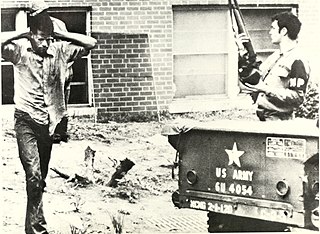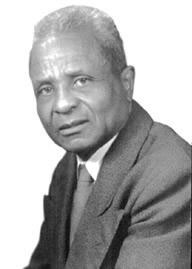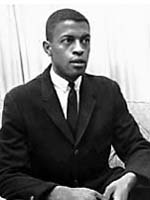Related Research Articles

North Carolina Agricultural and Technical State University is a public, historically black, land-grant research university in Greensboro, North Carolina. It is a constituent institution of the University of North Carolina System. Founded by the North Carolina General Assembly on March 9, 1891, as the Agricultural and Mechanical College for the Colored Race, it was the second college established under the provisions of the Morrill Act of 1890, as well as the first for people of color in the State of North Carolina. Initially, the college offered instruction in agriculture, English, horticulture and mathematics. In 1967, the college was designated a Regional University by the North Carolina General Assembly and renamed North Carolina Agricultural and Technical State University.

The Greensboro sit-ins were a series of nonviolent protests in February to July 1960, primarily in the Woolworth store—now the International Civil Rights Center and Museum—in Greensboro, North Carolina, which led to the F. W. Woolworth Company department store chain removing its policy of racial segregation in the Southern United States. While not the first sit-in of the civil rights movement, the Greensboro sit-ins were an instrumental action, and also the best-known sit-ins of the civil rights movement. They are considered a catalyst to the subsequent sit-in movement, in which 70,000 people participated. This sit-in was a contributing factor in the formation of the Student Nonviolent Coordinating Committee (SNCC).
February One: The Story of the Greensboro Four is a 2003 documentary film by Rebecca Cerese and Steven Channing. Nationally broadcast on Independent Lens on PBS, it tells the story of The Greensboro Four, four young college freshman, Joseph McNeil, David Richmond, Franklin McCain and Ezell Blair, Jr. now Jibreel Khazan, who staged a sit-in at Woolworth's in 1960 to protest segregation practices. Based largely on first hand accounts and rare archival footage, the documentary film February One documents one volatile winter in Greensboro that not only challenged public accommodation customs and laws in North Carolina, but served as one of the blueprints for the nonviolent protests that occurred across the South and the nation during the Civil Rights Movement in the 1960s.

The International Civil Rights Center & Museum (ICRCM) is located in Greensboro, North Carolina, United States. Its building formerly housed the Woolworth's, the site of a nonviolent protest in the civil rights movement. Four students from North Carolina Agricultural and Technical State University started the Greensboro sit-ins at a "whites only" lunch counter on February 1, 1960. The four students were Franklin McCain, Joseph McNeil, Ezell Blair Jr., and David Richmond. The next day there were twenty students. The aim of the museum's founders is to ensure that history remembers the actions of the A&T Four, those who joined them in the daily Woolworth's sit-ins, and others around the country who took part in sit-ins and in the civil rights movement. The Museum is currently supported by earned admissions and Museum Store revenues. The project also receives donations from private donors as a means of continuing its operations. The museum was founded in 1993 and officially opened its doors fifty years to the day after the sit-in movements in Greensboro NC.

Clarence Lee "Curly" Harris was the store manager at the F. W. Woolworth Company store in Greensboro, North Carolina, during the Greensboro sit-ins in 1960.
Douglas E. Moore was a Methodist minister who organized the 1957 Royal Ice Cream Sit-in in Durham, North Carolina. Moore entered the ministry at a young age. After finding himself dissatisfied with what he perceived as a lack of action among his divinity peers, he decided to take a more activist course. Shortly after becoming a pastor in Durham, Moore decided to challenge the city's power structure via the Royal Ice Cream Sit-in, a protest in which he and several others sat down in the white section of an ice cream parlor and asked to be served. The sit-in failed to challenge segregation in the short run, and Moore's actions provoked a myriad of negative reactions from many white and African-American leaders, who considered his efforts far too radical. Nevertheless, Moore continued to press forward with his agenda of activism.

James Benson Dudley High School is located in Guilford County in the city of Greensboro, North Carolina. Dudley High School was founded in 1929 as the first black high school in Guilford County, in a school system segregated by law. The school was named for James Benson Dudley.
Joseph Alfred McNeil is a retired major general in the United States Air Force who is best known for being a member of the Greensboro Four—a group of African American college students who, on February 1, 1960, sat down at a segregated Woolworth's lunch counter in downtown Greensboro, North Carolina, challenging the store's policy of denying service to non-white customers.

Randolph T. Blackwell was an American activist of the Civil Rights Movement, serving in Martin Luther King Jr.'s Southern Christian Leadership Conference, amongst other organizations. Coretta Scott King described him as an "unsung giant" of nonviolent social change.

The 1969 Greensboro uprising occurred on and around the campuses of James B. Dudley High School and North Carolina Agricultural and Technical State University (A&T) in Greensboro, North Carolina, when, over the course of May 21 to May 25, gunfire was exchanged between student protesters, police and National Guard. One bystander, sophomore honors student Willie Grimes, was killed, although whether he was killed by police or protesters remains unknown.

Franklin Eugene McCain was an American civil rights activist and member of the Greensboro Four. McCain, along with fellow North Carolina A&T State University students Ezell Blair Jr., Joseph McNeil and David Richmond, staged a sit-in protest at the Woolworth lunch counter in Greensboro, North Carolina, on February 1, 1960, after they were refused service due to the color of their skin. Their actions were credited with launching the Greensboro sit-ins, a massive protest across state lines involving mostly students who took a stand against discrimination in restaurants and stores by refusing to leave when service was denied to them. The sit-ins successfully brought about the reversal of Woolworth's policy of racial segregation in their southern stores, and increased national sentiment to the fight of African-Americans in the south.
The history of North Carolina Agricultural and Technical State University, the first land grant college for people of color in the state of North Carolina, can be traced back to 1890, when the United States Congress enacted the Second Morrill Act which mandated that states provide separate colleges for the colored race. The "Agricultural and Mechanical College for the Colored Race" was established On March 9, 1891 by an act of the General Assembly of North Carolina and began in Raleigh, North Carolina as an annex to Shaw University. The college made a permanent home in Greensboro with the help of monetary and land donation by local citizens. The college granted admission to both men and women from 1893 to 1901, when the board of trustees voted to restrict admission to males only. This policy would remain until 1928, when female students were once again allowed to be admitted.

Warmoth Thomas Gibbs Sr. was an American educator, retired Second Lieutenant in the United States Army, civil rights activist, and fourth president of North Carolina Agricultural and Technical State University. Gibbs was one of the first black commissioned officers in World War I and served as president of then North Carolina Agricultural and Technical College from 1955 to 1960. During his presidency, North Carolina A&T became accredited by the Southern Association of Schools and Colleges.

Lewis Carnegie Dowdy was an American educator and the sixth president, and first chancellor of North Carolina Agricultural and Technical State University.
February One is the name of the 2002 monument dedicated to Ezell Blair Jr., Franklin McCain, Joseph McNeil and David Richmond who were collectively known as the Greensboro Four. The 15-foot bronze and marble monument is located on the western edge of the campus of North Carolina Agricultural and Technical State University in Greensboro, North Carolina. James Barnhill, the sculptor who created the monument, was inspired by the historic 1960 image of the four college aged men leaving the downtown Greensboro Woolworth store after holding a sit-in protest of the company's policy of segregating its lunch counters. The sit-in protests were a significant event in the Civil Rights Movement due to increasing national sentiment of the fight for the civil rights of African-Americans during this period in American history.

David Leinail Richmond was a civil rights activist for most of his life, but he was best known for being one of the Greensboro Four. Richmond was a student at North Carolina A&T during the time of the Greensboro protests, but never ended up graduating from A&T. He felt pressure from the residual celebrity of being one of the Greensboro Four; his life was threatened in Greensboro and he was forced to move to Franklin, NC. Eventually, he moved back to Greensboro to take care of his father. Richmond was awarded the Levi Coffin Award for leadership in human rights by the Greensboro Chamber of Commerce in 1980. Richmond seemed to be haunted by the fact that he could not do more to improve his world, and battled alcoholism and depression. He died in 1990 and was awarded a posthumous honorary doctorate degree from North Carolina A&T

The sit-in movement, sit-in campaign or student sit-in movement, were a wave of sit-ins that followed the Greensboro sit-ins on February 1, 1960 in North Carolina. The sit-in movement employed the tactic of nonviolent direct action and was a pivotal event during the Civil Rights Movement.
Joseph Charles Jones was an American civil rights leader, attorney, co-founder of the Student Nonviolent Coordinating Committee (SNCC), and chairperson of the SNCC's direct action committee.
Seizing Justice: The Greensboro 4 is a 2010 television documentary film by Lynn Kessler for the Smithsonian Channel. It tells the story of The Greensboro Four through photographs, archival footage and interviews from Joseph McNeil, David Richmond, Franklin McCain and Jibreel Khazan, three of the four men who began the sit-in at Woolworth's in 1960 to protest segregation practices. The film also includes interviews from historians from the Smithsonian Museum of American History and civil right leader and congressman John Lewis.
References
- 1 2 "Civil Rights Greensboro: Jibreel Khazan". University of North Carolina at Greensboro. Archived from the original on 2014-01-15. Retrieved 2014-03-25.
- ↑ Davis, Townsend (1998). Weary Feet, Rested Souls: A Guided History of the Civil Rights Movement . New York: W. W. Norton & Company. p. 311. ISBN 0-393-04592-7.
- 1 2 3 "Jibreel Khazan (Formerly Ezell Blair Jr.)". Video Dialog Inc. Retrieved 2008-01-21.
- ↑ "Oral History Interview with Jibreel Khazan by William Chafe :: Civil Rights Greensboro". libcdm1.uncg.edu. Retrieved 2020-01-05.
- 1 2 3 4 Chafe, William H. (1980). Civilities and civil rights : Greensboro, North Carolina, and the Black struggle for freedom. New York: Oxford U.P. p. 81. ISBN 0-19-502625-X . Retrieved 19 August 2014.
- ↑ "Ezell Blair, Stokely Carmichael, Lucy Thornton and Jean Wheeler | Who Speaks for the Negro?". whospeaks.library.vanderbilt.edu. Retrieved 2021-01-18.
- ↑ https://static1.squarespace.com/static/6227923dd7da1058393d02ff/t/65805f4dd1b23606b9ee9fdb/1702911822773/J.+Khazan+transcript+formatted.pdf
- 1 2 "The A&T Four: February 1st, 1960". The F.D. Bluford Library • North Carolina Agricultural and Technical State University . Retrieved 20 August 2014.[ permanent dead link ]
- ↑ "FebruaryOne: The Story of the Greensboro Four". PBS. 2008-01-21.
- ↑ "A&T History". The F.D. Bluford Library • North Carolina Agricultural and Technical State University. Archived from the original on 9 October 2021. Retrieved 20 June 2014.
- ↑ Trescott, Jacqueline (5 February 2010). "50 years later, Greensboro Four get Smithsonian award for civil rights actions". The Washington Post . Retrieved 20 June 2014.
- ↑ Paleologos, Phil (18 October 2021). "New Bedford Must Lift Up Celebration of Dr. Jibreel Khazan With a Statue". wbsm.com . Retrieved 9 March 2023.
- ↑ "Different paths for sit-in leaders". Greensboro News & Record . 14 January 2014. Retrieved 19 August 2014.
